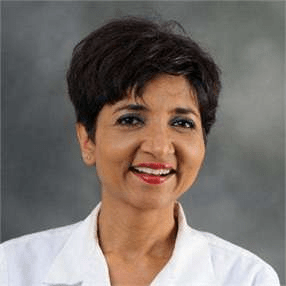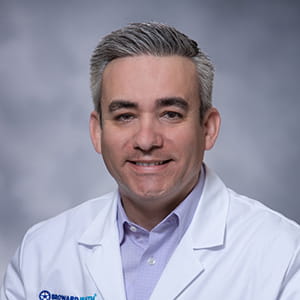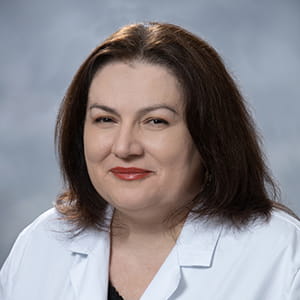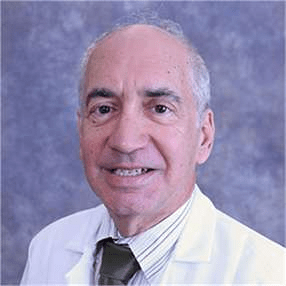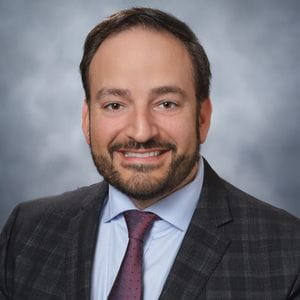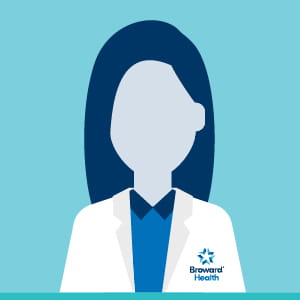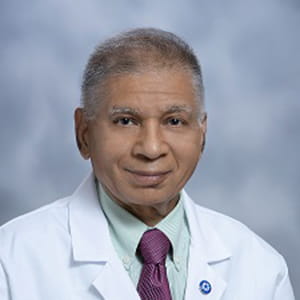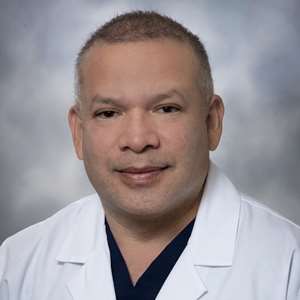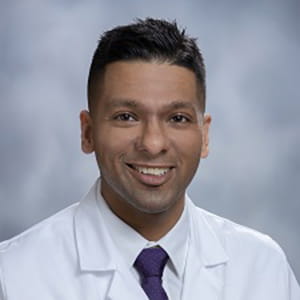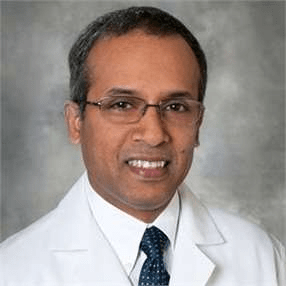Internal Medicine Residency
The Internal Medicine Residency Program at Broward Health Medical Center is a three-year training program that has been designed to include emphasis on continuity of care and to provide opportunities for patient care in both hospital and ambulatory settings.
Internal Medicine Residency
Director:
Cristina Savu, D.O.
Coordinator:
Latress Kenon
Phone:
954-712-6356
Welcome from the Program Director
Dear Residency Candidate,
Welcome to Broward Health Internal Medicine Residency Program! We are dedicated to providing you with a world-class residency education in a setting that is friendly, warm, and supportive. Broward Health is a nationally recognized system that has provided world-class healthcare services to our neighbors in South Florida for more than 85 years. Broward Health includes four major hospitals and more than 30 locations and offices overall.
All residents are provided with individualized training and mentoring so that they can pursue their highest aspirations as physicians, whether in primary care, in hospital medicine, or through additional training in fellowship programs.
In addition to an extraordinary faculty, the Broward Health Internal Medicine Residency Program offers our residents outstanding educational experiences within several areas of residency training. Our hospital has developed a model for integrating hospitalists and residents in a way that dramatically improves both inpatient care and residents’ educational outcomes. Care for adult medicine patients at the health center is provided largely by resident physicians closely supervised by dedicated attending faculty.
Finally, strong research opportunities assist our residents’ educational experience. All trainees are encouraged to pursue scholarly activity, and faculty members involved in research are eager for resident participation. Residents and faculty at Broward Health regularly present at national academic meetings. Therefore, numerous opportunities to become involved in research projects are available.
Thank you for choosing Broward Health Internal Medicine Residency Program.
Sincerely,
Cristina Savu, DO
Internal Medicine Program Director
About the Program
The Internal Medicine Residency Program at Broward Health Medical Center provides an opportunity to care for a diverse patient population in a department with a history of commitment to the highest standards of medical education, clinical care, and community service.
Program Highlights
The program plays a significant role in the quality of patient care and has a critical responsibility for the education of other trainees in the department. Consequently, we seek a diverse and inquisitive house staff for our program who:
- Share our values of the primacy of clinical excellence and the highest professional standards in clinical and academic endeavors
- Are highly devoted to the welfare of their patients and to the broader community that we serve;
- Aspire to be positive role models and to lead by example
- Seek a collegial and rigorous learning environment
- Value diversity in their peers and their patients
- Seek questions as well as answers
- Find satisfaction in teaching patients and other trainees
- Are excited about developing habits of learning and analytical skills that will foster continuous growth throughout their career; and
- Have a strong desire to partner with the faculty of our department in improving both patient care and our house staff training program.
The strength of our program rests in the diversity of the patient population and in a department devoted to academic and clinical excellence. This commitment to excellence produces graduates who are superbly trained in primary medical care, with clinical and didactic skills that empower the resident to succeed in a broad range of careers in medicine.
Curriculum
Training Blocks and Sites
Following are detailed descriptions of the rotations for each post-graduate year of training in the internal medicine residency program.PGY-1 Rotations
Inpatient Ward Rotation
The general medical ward rotation is the most intense learning experience during residency. Direct care of hospitalized patients is the cornerstone of developing a resident’s skills as an internal medicine physician. Residents will receive a broad introduction to the evaluation and management of a wide variety of diseases related to general internal medicine. In addition to the routine case mix for general internal medicine wards, the rotation provides a unique opportunity for residents to consider the complex relationships between health status and poverty including in depth clinical experiences with substance abuse, co-morbid medical and psychiatric disease, geriatrics, HIV/ AIDS, homelessness, international and immigrant health. The inpatient service functions on the premise of shared responsibility between house officers and attending staff. Interns will admit and manage patients completely, calling upon the resident and attending staff for consent and guidance when indicated. House officers write all orders. The attending, who may or may not have ongoing relationships with the patients, have legal responsibility for patient care. Residents, as trainees, and attending as teachers will collaborate to guarantee their patients the best medical care, the best learning experience, and the most collegial and satisfying work environment possible.
Night Float Rotation
The general medical ward rotation is covered overnight by a team of residents who are assigned to the Night Float team.
Direct care of hospitalized patients is the cornerstone of developing a resident’s skills as an internal medicine physician. Residents will receive a broad introduction to the evaluation and management of a wide variety of diseases related to general internal medicine. In addition to the routine case mix for general internal medicine wards, the rotation provides a unique opportunity for residents to consider the complex relationships between health status and poverty including in depth clinical experiences with substance abuse, co-morbid medical and psychiatric disease, geriatrics, HIV/AIDS, homelessness, international and immigrant health.
Medical Intensive Care Unit Rotation
The Intensive Care Unit is a dynamic environment that provides valuable experience needed to complete your medical residency. Critical Care Medicine is a discipline that involves patients with a host of medical problems and is characterized by a multidisciplinary approach to management.
Cardiology Consult Rotation
The Cardiology Consult service provides a valuable experience needed to complete your medical residency. Cardiovascular Medicine is a discipline that involves patients with primarily cardiovascular medical problems and is characterized by a multidisciplinary approach to management. Attending physicians for this rotation include Cardiologists.
Emergency Medicine Rotation
The Emergency Medicine rotation is designed to give Residents access to first touch on patients with acute undiagnosed illness and disease. During the rotation, the faculty physicians teach the resident physicians the principles of emergency management of patients presenting with a wide variety of acute, sub-acute and chronic medical, surgical, and gynecologic problems. The resident physician will achieve competency in the triage of all medical emergencies.
PGY-2 Rotations
Night float Rotation
The general medical ward rotation is covered overnight by a team of residents who are assigned to the Night Float team.
Direct care of hospitalized patients is the cornerstone of developing a resident’s skills as an internal medicine physician. Residents will receive a broad introduction to the evaluation and management of a wide variety of diseases related to general internal medicine. In addition to the routine case mix for general internal medicine wards, the rotation provides a unique opportunity for residents to consider the complex relationships between health status and poverty including in depth clinical experiences with substance abuse, co-morbid medical and psychiatric disease, geriatrics, HIV/AIDS, homelessness, international and immigrant health.
Nephrology Rotation
This rotation is designed to give the resident experience in the care of complex hospitalized renal patients. The rotation is run by a Nephrology attending. Patients seen include inpatients with renal insufficiency, nephrotic syndrome, nephritis, and end-stage renal disease.
Hematology/Oncology Rotation
This rotation is designed to provide residents with the knowledge necessary to evaluate and treat a diverse group of hematologic and oncologic disorders. Including the care of the patients with acute or chronic leukemia or lymphoma, most of whom develop complications related to cytopenias. Practical management of co-morbid medical problems is stressed along with the management of major hematologic disorders. The medical knowledge and the clinical interactive skills developed on this service can be applied to any patient who is immunocompromised and/or has a life threatening illness.
This rotation also includes the care of patients newly diagnosed with cancer, patients actively receiving chemotherapy and patients suffering from complications related to chemotherapy or cancer. End of the life issues, pain management, palliative care, and ethical issues are emphasized with practical experience in dealing with the dying patient.
Medical Intensive Care Unit Rotation
The Intensive Care Unit is a dynamic environment that provides valuable experience needed to complete your medical residency. Critical Care Medicine is a discipline that involves patients with a host of medical problems and is characterized by a multidisciplinary approach to management.
Pulmonary Consult Rotation
This rotation will provide medical residents with the knowledge necessary to evaluate and manage common pulmonary problems encountered in clinical practice, including asthma, COPD, Pneumonia, Occupational Lung Disease, and Tuberculosis. Residents will develop skills for critical thinking with respect to clinical databases, radiologic and physiologic studies and reports from the medical literature. In addition, residents will learn to distinguish pulmonary conditions that can be managed by the general internist and those that require subspecialty consultation.
Cardiac Care Unit Rotation
The Cardiac Care Unit is a high energy environment that provides the experience needed to complete your medical residency. Cardiovascular Medicine is a discipline that involves patients with primarily cardiovascular medical problems and is characterized by a multidisciplinary approach to management. Attending physicians for this rotation include Cardiologists and Critical Care physicians.
Infectious Diseases Rotation
On this rotation, the resident will demonstrate competence in the evaluation and management of both inpatient and outpatient infectious diseases. This will include experience in the evaluation and management of common infectious disease problems in the adult hospitalized patient. The rotation will emphasize the rational use of antimicrobial agents and the prevention and treatment of hospital-acquired infections. Residents will review all culture data and other test results, as well as pertinent physical findings on their patients, and present to the attending.
Internal Medicine Selective
The selective rotations are each Internal Medicine subspecialty rotations with an inpatient and outpatient component. Each of the subspecialty areas is considered to be a core part of the growth and development of an internal medicine physician. The selective rotations include Gastroenterology, Nephrology, Palliative Medicine, and Oncology.
Elective Rotation
There are a wide variety of elective rotations that may be done by the PGY-2 and PGY-3 residents.
PGY-3 Rotations
Night Float Rotation
The general medical ward rotation is covered overnight by a team of residents who are assigned to the Night Float team. Direct care of hospitalized patients is the cornerstone of developing a resident’s skills as an internal medicine physician. Residents will receive a broad introduction to the evaluation and management of a wide variety of diseases related to general internal medicine. In addition to the routine case mix for general internal medicine wards, the rotation provides a unique opportunity for residents to consider the complex relationships between health status and poverty including in depth clinical experiences with substance abuse, co-morbid medical and psychiatric disease, geriatrics, HIV/ AIDS, homelessness, international and immigrant health.
Inpatient Ward Rotation
The general medical ward rotation is the most intense learning experience during residency. Direct care of hospitalized patients is the cornerstone of developing a resident’s skills as an internal medicine physician. Residents will receive a broad introduction to the evaluation and management of a wide variety of diseases related to general internal medicine. In addition to the routine case mix for general internal medicine wards, the rotation provides a unique opportunity for residents to consider the complex relationships between health status and poverty including in depth clinical experiences with substance abuse, co-morbid medical and psychiatric disease, geriatrics, HIV/ AIDS, homelessness, international and immigrant health. The inpatient service functions on the premise of shared responsibility between house officers and attending staff. Interns (and acting-interns) will admit and manage patients completely, calling upon the resident and attending staff for consent and guidance when indicated. House officers write all orders. The attending, who may or may not have ongoing relationships with the patients, have legal responsibility for patient care. Residents, as trainees, and attending as teachers will collaborate to guarantee their patients the best medical care, the best learning experience, and the most collegial and satisfying work environment possible.
Geriatrics Rotation
The Geriatrics rotation provides a valuable experience needed to complete your medical training. This rotation provides medical residents with knowledge necessary to evaluate and treat a diverse group of older adults over the age of 62, and those younger patients with complex medical co-morbidities that qualify for care on the Geriatric Medicine service. The rotation focuses on the seven domains of geriatric competencies, considered to be integral in the training of internal medicine residents, as set forth in 2008 by the American Medical Association, American Geriatrics Society, American Board of Family Medicine, and the Society of General Internal Medicine. The domains defining the care of older patients include: Complex or Chronic Illness(es) in Older Adults; Ambulatory care; Medication Management; Hospital Patient Safety; Cognitive, Affective, and Behavioral Health; Transitions of Care; Palliative and End of Life Care
Neurology Rotation
On this rotation, the resident will develop and demonstrate competence in the evaluation, diagnosis and management of both inpatient and outpatient neurology patients. The rotation will provide medical residents with the knowledge base and practical experience in the evaluation and treatment of common and emergent neurologic problems. Residents will learn to distinguish neurologic conditions that can be managed by the general internist and those that require subspecialty consultation.
Endocrinology Rotation
The Endocrinology rotation provides a valuable experience needed to complete your medical training. The educational purpose of this rotation is to teach you the knowledge and skills within the medical specialty of endocrinology necessary for the management of general internal medicine patients. You will acquire skills sufficient to diagnose, follow, and treat patients with common endocrine disorders and recognize those patients that should be referred to endocrinologists.
Internal Medicine Selective
The selective rotations are each Internal Medicine subspecialty rotations with an inpatient and outpatient component. Each of the subspecialty areas is considered to be a core part of the growth and development of an internal medicine physician. The selective rotations include Gastroenterology, Nephrology, Palliative Medicine, and Oncology.
Elective Rotation
There are a wide variety of elective rotations that may be done by the PGY-2 and PGY-3

Meet our Residents
Meet our residents from across the country and abroad, representing the diverse culture of South Florida. Broward Health takes pride in its training programs with broad perspectives that enrich the residents' learning experience.
Internal Medicine BHMC